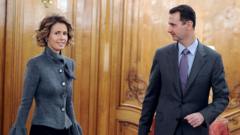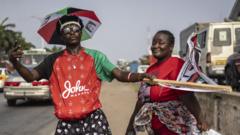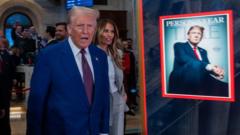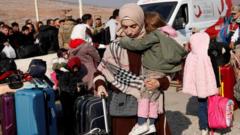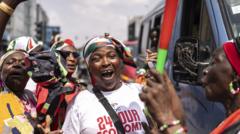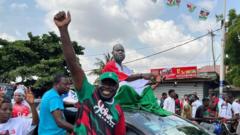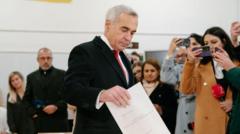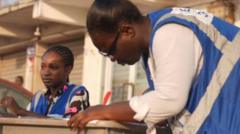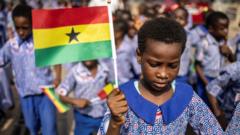Ghana's political landscape experiences a shakeup as John Dramani Mahama secures his return to power after an eight-year hiatus, largely due to the country's pressing economic challenges. The election outcome also demonstrates the electorate's desire for change and the potential for a new political era.
John Dramani Mahama's Remarkable Return: A Ghanaian Political Comeback

John Dramani Mahama's Remarkable Return: A Ghanaian Political Comeback
Former President John Dramani Mahama wins Ghana's presidential election, signaling a shift in public sentiment amid economic struggles.
On December 8, 2024, former President John Dramani Mahama, ousted from power eight years prior, emerged victorious in Ghana's presidential election after Vice President Mahamudu Bawumia conceded defeat. While the official voting results are pending, Bawumia announced his congratulations to Mahama, stating, “Our internal collation of the election results indicates that former President John Dramani Mahama has won decisively.”
Ghana, recognized as Africa's largest gold producer and an essential ally to the United States, has faced one of its most severe economic crises in recent history. The loss of Bawumia, part of the current administration struggling to address the overwhelming cost-of-living challenges, reflects a strong desire for significant change among Ghanaians. In his concession, Bawumia also noted that Mahama's party won the parliamentary elections, asserting, “The ultimate outcome will not change.”
Economic factors significantly influenced the election, reminiscent of the 2016 contest when Mahama lost to Nana Akufo-Addo amid a tumultuous economic backdrop caused by falling oil prices. Both candidates, representing historical injustices against the northern regions in Christian-majority Ghana, bring a notable dichotomy: Mahama identifies as Christian while Bawumia identifies as Muslim.
Despite some election-day disturbances, the largely peaceful nature of the vote and Bawumia’s swift concession indicated a smooth democratic process ahead. Nana Akufo-Addo is set to complete his term on January 7. Emphasizing the importance of peace, Bawumia stated, “I am making this concession speech before the official announcement by the Electoral Commission to avoid further tension and preserve the peace of our country.”
The election in Ghana aligns with recent encouraging political developments in West Africa, including a successful presidential contest in Senegal, showcasing a regional yearning for stability that contrasts sharply with ongoing issues such as coups, election delays, and aging leaders being resistant to term limits.
During his campaign, Mahama pledged to "reset" the nation, aiming to connect with younger voters and present himself as capable of steering Ghana out of the ongoing economic quagmire. As Ghana transitions into this next chapter, Mahama’s leadership will be scrutinized under the pressing weight of economic recovery and national unity.
Ghana, recognized as Africa's largest gold producer and an essential ally to the United States, has faced one of its most severe economic crises in recent history. The loss of Bawumia, part of the current administration struggling to address the overwhelming cost-of-living challenges, reflects a strong desire for significant change among Ghanaians. In his concession, Bawumia also noted that Mahama's party won the parliamentary elections, asserting, “The ultimate outcome will not change.”
Economic factors significantly influenced the election, reminiscent of the 2016 contest when Mahama lost to Nana Akufo-Addo amid a tumultuous economic backdrop caused by falling oil prices. Both candidates, representing historical injustices against the northern regions in Christian-majority Ghana, bring a notable dichotomy: Mahama identifies as Christian while Bawumia identifies as Muslim.
Despite some election-day disturbances, the largely peaceful nature of the vote and Bawumia’s swift concession indicated a smooth democratic process ahead. Nana Akufo-Addo is set to complete his term on January 7. Emphasizing the importance of peace, Bawumia stated, “I am making this concession speech before the official announcement by the Electoral Commission to avoid further tension and preserve the peace of our country.”
The election in Ghana aligns with recent encouraging political developments in West Africa, including a successful presidential contest in Senegal, showcasing a regional yearning for stability that contrasts sharply with ongoing issues such as coups, election delays, and aging leaders being resistant to term limits.
During his campaign, Mahama pledged to "reset" the nation, aiming to connect with younger voters and present himself as capable of steering Ghana out of the ongoing economic quagmire. As Ghana transitions into this next chapter, Mahama’s leadership will be scrutinized under the pressing weight of economic recovery and national unity.




